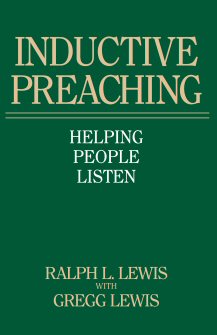Inductive Preaching: Helping People Listen

Overview
Every preacher, at some point in their ministry, will experience a sense that despite all their efforts and preparations during the week, no one is listening on Sunday morning, only receiving blanks stares from the people of the congregation. It doesn’t have to be that way. You can learn to preach in a way that will be readily, even eagerly, received by your congregation.
It’s all here: what inductive preaching is, how it works, why it’s effective, who’s used it—including Jesus, Peter, Paul, Augustine, St. Francis, Wesley, Edwards, and Moody, to name only a few.

Key Features
- Includes step-by-step guidelines for constructing an inductive sermon
- Two sample inductive sermons
- Provides a strategy for making traditional sermon structures inductive
Contents
- Need
- A Promising Solution
- Old Parts and New Hope
- The Story of Induction
- God's Way?
- Master Model
- Web and Flow
- More Web and Flow
- Unbeatable Combination
- In the Study
- Behind the Pulpit
- End to Our Means
Top Highlights
“Almost 83 percent of the respondents judged warmth, friendliness, and kindness in a minister’s sermon just as important or more so than theological expertise or intellectual soundness.” (Page 24)
“A preacher can’t preach an inductive sermon without an attitude of tolerance, charity, respect, trust, cooperation and patience toward the hearers.” (Page 44)
“Induction begins with the particulars of life experience and points toward principles, concepts, conclusions. The inductive course can grow out of the hearer’s needs rather than the uncertainty of the preacher. The preacher seeks to lead rather than push. He explores with the people before he explains what they find. Inductive preaching is a quest for discovery. It can disarm, interest and involve the people in the exploration and capitalize on the psychological process of learning from experience.” (Page 32)
“Jesus used two distinct styles of communication, depending on the situation and audience. He did sometimes use a didactic, deductive approach—but only when speaking to his disciples and other believers. When he spoke to the public, to the multitudes, his approach was always indirect and inductive.” (Page 75)
“Some of these researchers are now concluding that humans learn only by participation, by involvement. They insist no one learns only by being told; what is learned must be anchored to our reality by experience.” (Page 29)
Product Details
- Title: Inductive Preaching: Helping People Listen
- Authors: Ralph L. Lewis and Gregg Lewis
- Publisher: Crossway
- Publication Date: 1983
- Pages: 228
- Resource Type: Monograph
- Topic: Preaching
About the Authors
Ralph L. Lewis is professor of preaching at Asbury Theological Seminary in Wilmore, Kentucky, a post he has held since 1961. Dr. Lewis holds a PhD in speech from the University of Michigan and was a pastor for 12 years.
Gregg Lewis, his son, is editor of Campus Life magazine. A coauthor of The Hurting Parent, he holds an MA in communications from Wheaton College.
Sample Pages from the Print Edition
Reviews
1 rating

Olli-Pekka Ylisuutari
11/8/2021
I must heartily recommend this resource! The Lewises critizice the way many preachers use only deductive logic and assume authority, announcing the proposition they are going to defend – at the outset of the sermon. This may work in small rural congregations, where everybody at church is a Christian and the preacher/pastor/priest is an authority figure. But the problem is, once you announce your proposition at the beginning, there really are no surprises left, after that. The authority figure becomes boring. Inductive preaching works the other way around: you start with (many times the mundane and the banal) observations of induction, assuming no authority, but rather build up your authority as you preach. You do this by finding a common ground with your audience. The audience may be quite critical (not necessarily). Works in urban settings and with the the more sceptical and the youth, they claim. The figure with no assumed authority becomes interesting, so they say.